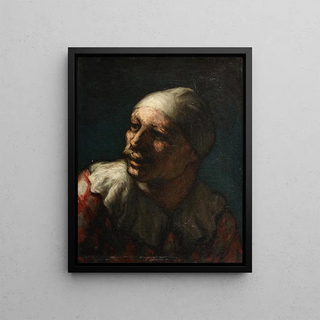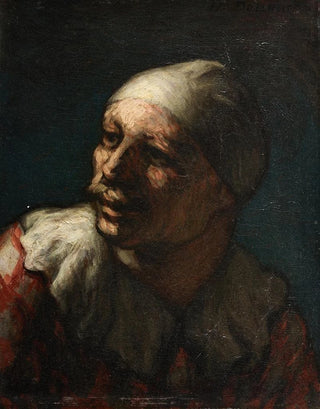Art print | Pasquin Head - Honoré Daumier


View from behind

Frame (optional)
Honoré Daumier’s "Pasquin Head" is a work that transcends a simple portrait to become a true reflection on the human condition and social satire. Created in the 19th century, this iconic piece demonstrates the artist’s skill in capturing the very essence of his subjects. Through this expressive face, Daumier invites us to an introspection on the flaws of society of his time, while maintaining a relevance that still resonates today. The art print of this work allows for an appreciation of the depth of its message while adding a touch of elegance to any space.
Style and uniqueness of the work
Daumier’s style is characterized by striking realism, where every detail is carefully thought out to emphasize emotions. In the "Pasquin Head", the facial features are both caricatural and deeply human, illustrating a subtle balance between mockery and compassion. The artist uses shadows and lights to bring his subject to life, creating an almost palpable atmosphere. The way he plays with facial expressions allows the viewer to feel an immediate connection, an invitation to reflect on the topics addressed. Indeed, this work does not merely depict a face; it embodies a social and political critique that, at the time of its creation, was of burning relevance.
The artist and his influence
Honoré Daumier, an emblematic figure of French art, established himself as a pioneer of realism. His work is deeply rooted in the social issues of his era, and he used his art as a means of denunciation. Through his lithographs, sculptures, and paintings, he explored injustices and absurdities of daily life. The art print of "Pasquin Head" fits within this desire to make the voice of the people resonate. Daumier influenced many artists who followed, laying the foundations of an engaged art aware of sociopolitical realities. His ability to marry aesthetics and message makes him an essential artist, whose legacy endures through the centuries.
An exceptional wall decoration signed Artem Le

Matte finish

View from behind

Frame (optional)
Honoré Daumier’s "Pasquin Head" is a work that transcends a simple portrait to become a true reflection on the human condition and social satire. Created in the 19th century, this iconic piece demonstrates the artist’s skill in capturing the very essence of his subjects. Through this expressive face, Daumier invites us to an introspection on the flaws of society of his time, while maintaining a relevance that still resonates today. The art print of this work allows for an appreciation of the depth of its message while adding a touch of elegance to any space.
Style and uniqueness of the work
Daumier’s style is characterized by striking realism, where every detail is carefully thought out to emphasize emotions. In the "Pasquin Head", the facial features are both caricatural and deeply human, illustrating a subtle balance between mockery and compassion. The artist uses shadows and lights to bring his subject to life, creating an almost palpable atmosphere. The way he plays with facial expressions allows the viewer to feel an immediate connection, an invitation to reflect on the topics addressed. Indeed, this work does not merely depict a face; it embodies a social and political critique that, at the time of its creation, was of burning relevance.
The artist and his influence
Honoré Daumier, an emblematic figure of French art, established himself as a pioneer of realism. His work is deeply rooted in the social issues of his era, and he used his art as a means of denunciation. Through his lithographs, sculptures, and paintings, he explored injustices and absurdities of daily life. The art print of "Pasquin Head" fits within this desire to make the voice of the people resonate. Daumier influenced many artists who followed, laying the foundations of an engaged art aware of sociopolitical realities. His ability to marry aesthetics and message makes him an essential artist, whose legacy endures through the centuries.
An exceptional wall decoration signed Artem Le






